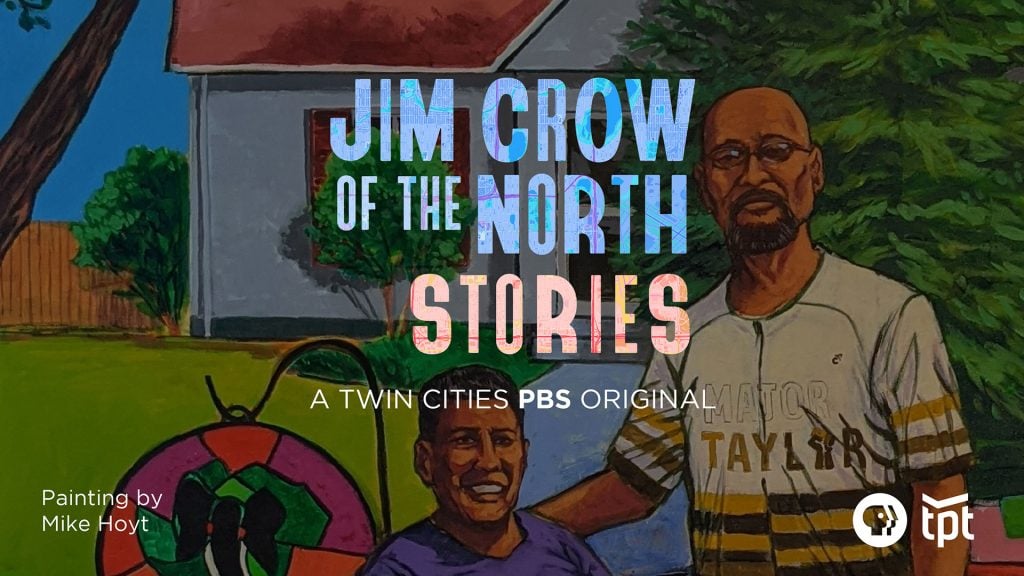
“This ethos and tactic of non-violence is what its practitioners like Gandhi, Dr. King and James Lawson called ‘Soulforce.’ And I hope our series of short films brings together the relevance of public history, the power of story and cinema, and -maybe- just a little bit of Soulforce.” ~ Daniel Bergin, TPT Executive Producer, shares the inspiration and motivation for TPT’s newest, digital-first series, Jim Crow of the North Stories.
—
In the mid 1920s, crosses were burned in the front yard of a Black family in Saint Paul. The burning cross, a totem of terror used by the Ku Klux Klan, was seen in greater Minnesota more times than you might want to know in the early 20th century. But the idea of a flaming cross lighting up a home in the Mac-Groveland neighborhood might be harder to imagine. But it happened. In this case, it was during a tense standoff between white residents and their new neighbors, the extraordinary Black Saint Paulites William and Nellie Francis.
Almost one hundred years later, you can see a different symbol in many front lawns in the Twin Cities. Not as intense as a KKK calling card but maybe more powerful.
That symbol is an artist created lawn sign that calls out the racist real estate clause, or ‘restrictive covenant,’ that was burned into the deeds of thousands of homes between 1910 and 1950.
Diver Van Avery, a creative, change-making artist/educator, sent me this note in an email in the winter of 2021, “I am working with incredible folks on a long-standing dream of a project that uses art/front yard lawn signs to make the history of racial covenants on deeds visible and palpable across Minneapolis.”
It sounded both mirthful and monumental. Could the display space used for pink flamingos, gnomes, and high school pride signs be the spot for a creative and provocative tool for racial justice? I thought it would be fun and informative to find out. So, this innovative art project became the impetus for the follow up stories to our groundbreaking film Jim Crow of the North.
Immediately after its release in 2019, Jim Crow of the North, moved through Minnesota, one screening and discussion after another, moving audiences with its combination of the Mapping Prejudice project’s irrefutable evidence of housing segregation plus the story of Black resistance over the century. Then, following the murder of George Floyd, the film became a widely watched touchstone for understanding of Minnesota’s -and America’s – deeply rooted systemic and interpersonal racism. But more than simply being afflicted by the revelations of this hidden history, Minnesotans have been moved to act on equity.
Van Avery and the Free the Deeds team created a multipronged art effort to create awareness and then spark action through community engagement. Their project includes artist designed lawn signs that call out the presence of a home’s restrictive covenant. Purchasing a sign (or just donating if your home doesn’t have a covenant) contributes to a homeownership fund effort based in a community land trust. The project also included the creation of stunning portraits and inspiring oral histories of Black homeowners that add humanity to the history and personify the power of homeownership.
One of the outcomes of the restrictive covenant data research of Mapping Prejudice, and the millions of views of Jim Crow of the North, was momentum for bipartisan legislation that allows Minnesota homeowners to ‘discharge’ the racist covenant in their home’s deed. But it is a complex and expensive process to do. So, this was a call to action for another story in our new series, the Just Deeds project that emerged out of the city of Golden Valley.
City Attorney Maria Cisneros, other municipal staff, and community partners decided to help Golden Valley and other Hennepin County homeowners go through the process of ridding their home of this stain of hate and systemic racism. “Our city council is very supportive even though doing this work requires us to examine some things about our own system that are not fun to talk about.” Says Cisneros. “But our leadership has been supportive. Our community has been very interested in learning about this and taking these steps together.”
Just Deeds, Free the Deeds, Mapping Prejudice, these groups are joined by thousands of Minnesotans who have engaged in this reflective approach to repairing what’s flawed and unfair.
Jim Crow of the North Stories was released widely on Martin Luther King, Jr Day (January 16, 2023). We feel like this was fitting timing as the stories acknowledge the pain and inequity rooted in our past but feature responses that use nonviolent, direct action. This ethos and tactic of non-violence is what its practitioners like Gandhi, Dr. King and James Lawson called “Soulforce.” And I hope our series of short films brings together the relevance of public history, the power of story and cinema, and -maybe- just a little bit of Soulforce.
Thanks to viewers like you, we are able to tell these stories, explore the history, and work toward creating a more equitable Twin Cities. Make sure to keep an eye out for new, weekly episodes of Jim Crow of the North Stories.

Daniel Bergin
Executive Producer
Twin Cities PBS
© Twin Cities Public Television - 2023. All rights reserved.
Read Next



